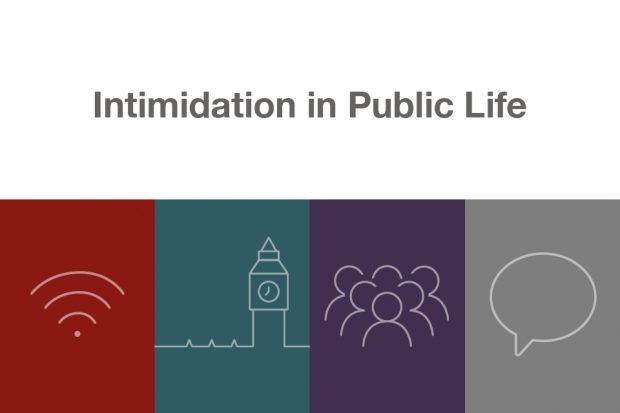
Since the publication of the Committee’s report on Intimidation in Public Life in 2017, it is evident that much has happened to tackle threats to those in public life, but there remains more to do.
Intimidation is not just a problem for national politicians and public figures, but is unfortunately the reality for local councillors, and all those holding public appointments, such as headteachers. It is completely unacceptable that individuals and, in some cases, their families, should be subject to threats and abuse for doing their job.
Intimidation is different from the legitimate persuasion or influence which takes place as part of the democratic process; intimidatory actions are not political pressure. Instead, they are intended to create fear and could cause an individual to withdraw from a public space, including social media, public events, or from public life altogether.
People do, of course, respond differently to intimidation but it can significantly affect an individual’s physical or mental health and wellbeing, as well as the wellbeing of those close to them.
Our 2017 report made recommendations to government, social media companies, political parties, the police, and others about the measures needed to deal with intimidation, which the Committee described as ‘a threat to the very nature of representative democracy in the UK’.
But the report also cautioned about the development of an unhealthy political culture affecting public life. Political turbulence since the 2016 referendum, Brexit and the current pandemic have had an impact on the public perception of those in public life. We need to be able to debate and disagree well.
This is not about returning to an age of deference for politicians or others in public life; scrutiny and robust debate are key pillars of our politics. Those in public life – whether elected or appointed – must abide by the Nolan principles – honesty, objectivity, selflessness, integrity, leadership, openness and accountability. Their actions and words have a great influence over our public discourse and political culture.
But democracy involves a reciprocal relationship between those in public life and the public. I recently discussed with the Chair of the LGA their consultation on the new model code for councillors. The need for civility to be a two-way street was a key theme from councillors. Individual citizens must also behave in a way that respects the principles and values on which our political system is built. Covid-19 seems to have raised further questions about appropriate behaviour, with councillors receiving intimidation and abuse as public frustration has increased. Especially in an atmosphere of frustration and mistrust, we must respect that with political engagement come responsibilities, which exist to protect the participation of every citizen in public life and public debate.
If intimidation and threats cause talented people to feel they have to leave public life, or deter good people from considering playing their part by standing as a councillor or a local MP, or applying for a public appointment, we will all have lost.
